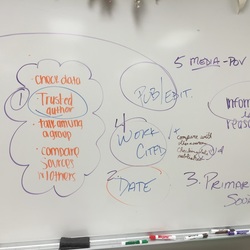
Be aware of the pros and cons of each and decide what is best for your paper. Remember a bad source makes for a bad paper and a bad reputation- no matter how skilled the author.
Here you will find out what we are up to every week. Want to learn to build a website or be a journalist? You will get your chance! :)
 Sometimes people get confused when looking for sources. Someone might have some easy rules, but they might not realize when or how to use them- or when to break them. We came up with 5 things to look for as a class. 1) Trusted author: What experience does this person have that lends them credibility and what background do they have that could affect their point of view. 2) Date: is it recent enough to be credible. How much has science changed what is known about your topic? If cell phones and technology change every 2 years- maybe we should be careful with things that are older than 10. Even history is changing because of new research in genetics. 3) Primary Source: The date thing could be thrown out of the window if it is a primary source- or rather current dates may be less respected if you are researching something older. A paper on the Constitution- should have a quote from the Constitution- not just modern authors writing about the constitution. 4) Cited Sources: If the author isn't an eye witness- are they using good sources. Do they cite direct quotes and have a work cited? 5) Media: Every type of media is going to have it's own point of view. Blogs are different than documentaries, history books are different than songs. Be aware of the pros and cons of each and decide what is best for your paper. Remember a bad source makes for a bad paper and a bad reputation- no matter how skilled the author. Creation stories from around the world Most societies have a story about how the world was created, how people got here, how the earth was formed. Whether that is considered science, religion or both, it may show us something about our heritage, politics, psychology, or thoughts today. While the whole class will look at Greek Mythology, this is a chance to explore the beginnings of the universe and look into a culture that is part of who you are or one that you are curious about. Remember we are looking for the story- a primary text if possible. Mayor found the bones of dinosaurs/griffins because she read the story- not because she looked up more names and dates. You are not doing a research paper on a religion/science. You are sharing a story from around the world. Classwork: Work on the Choosing Sources packet. Time with partner to work on presentation. Homework: Finish presentation to share Thursday/Friday. Grading on the presentation: Do you have more than once source (about 3+) and are they cited? Do you try to avoid language like: uncivilized, savage, primitive, weird, gross, etc. Be scientific. :)
0 Comments
Your comment will be posted after it is approved.
Leave a Reply. |
Categories
All
Archives
December 2019
|